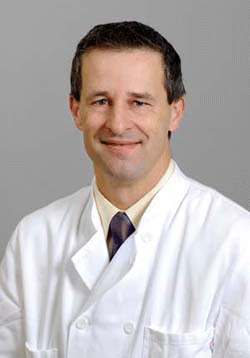Nonrandomized trials have suggested that intra-arterial delivery of chemoradiation would be superior to intravenous delivery of comparable chemoradiation in patients with inoperable head and neck cancer. Now, a randomized multi-institutional phase III trial demonstrates that there is no difference in clinical outcomes for patients treated with one method versus the other. Not everyone, however, is convinced that it is time to move to other approaches.
Explore This Issue
March 2007Surprisingly, there were no differences, no differences at all, in terms of tumor control between the two arms of the trial, said Coen Rasch, MD, Radiation Oncologist at the Netherlands Cancer Institute in Amsterdam, who presented the data at the annual meeting of the American Society for Therapeutic Radiology and Oncology (ASTRO) last fall. Since the current standard in the community is intravenous [delivery], we think intravenous will remain the standard of care.
Dr. Rasch’s team randomly assigned 240 patients with inoperable head and neck cancer to one of two arms: four courses of 150 mg/m2 cisplatin delivered intra-arterially into a carotid artery and intravenous sodium thiosulfate on days 2, 9, 16, and 23 (IA arm) or 100 mg/m2 intravenous cisplatin on days 1, 22, and 43 (IV arm). All patients received concurrent radiation of 70 Gy, delivered in seven fractions. Dr. Rasch and colleagues found that locoregional disease was controlled in 62% of patients in the IA arm and 68% of those in the IV arm at two years. Overall survival at two years was 61% and 63% in the IA and IV arms, respectively.
Theodore S. Lawrence, MD, PhD, Professor and Chair of the Department of Radiation Oncology at the University of Michigan Hospitals and Health System in Ann Arbor, and immediate past president of ASTRO, who led a press conference in which the data were presented, was philosophical about the results. Sometimes a very important study like this is a negative study, he said. This was a technique that is very difficult to do but very promising in the early results. Now we know, through this carefully carried-out study, that we should focus our energies on new approaches elsewhere. Sometimes that is a very important finding.
Abandon IA? Not Yet
Not everyone is ready to abandon the IA approach, however.
K. Thomas Robbins, MD, Director of the SimmonsCooper Cancer Institute and Professor of Otolaryngology-Head and Neck Surgery at Southern Illinois University School of Medicine in Springfield, who has led several of the past phase II trials testing IA delivery, said that although he gives kudos to the Dutch team for taking on the study, the exact methods they used for the trial might have limited the efficacy of IA delivery.

Leave a Reply